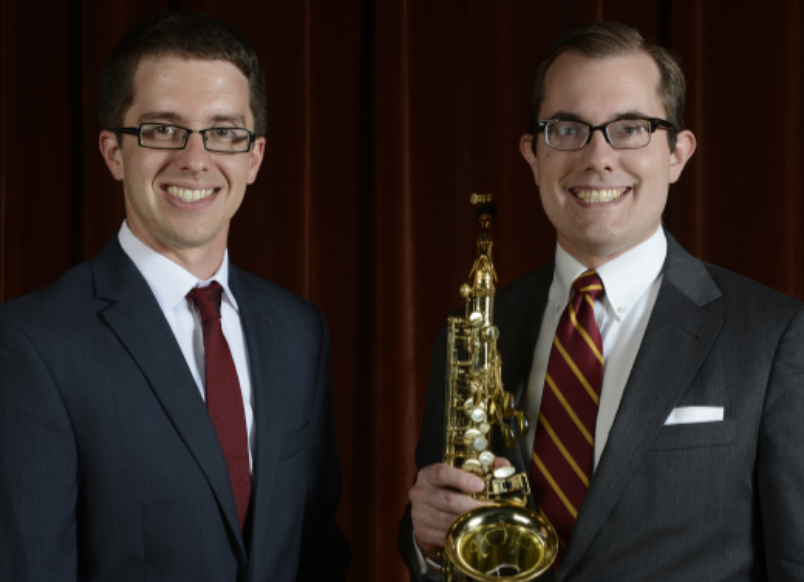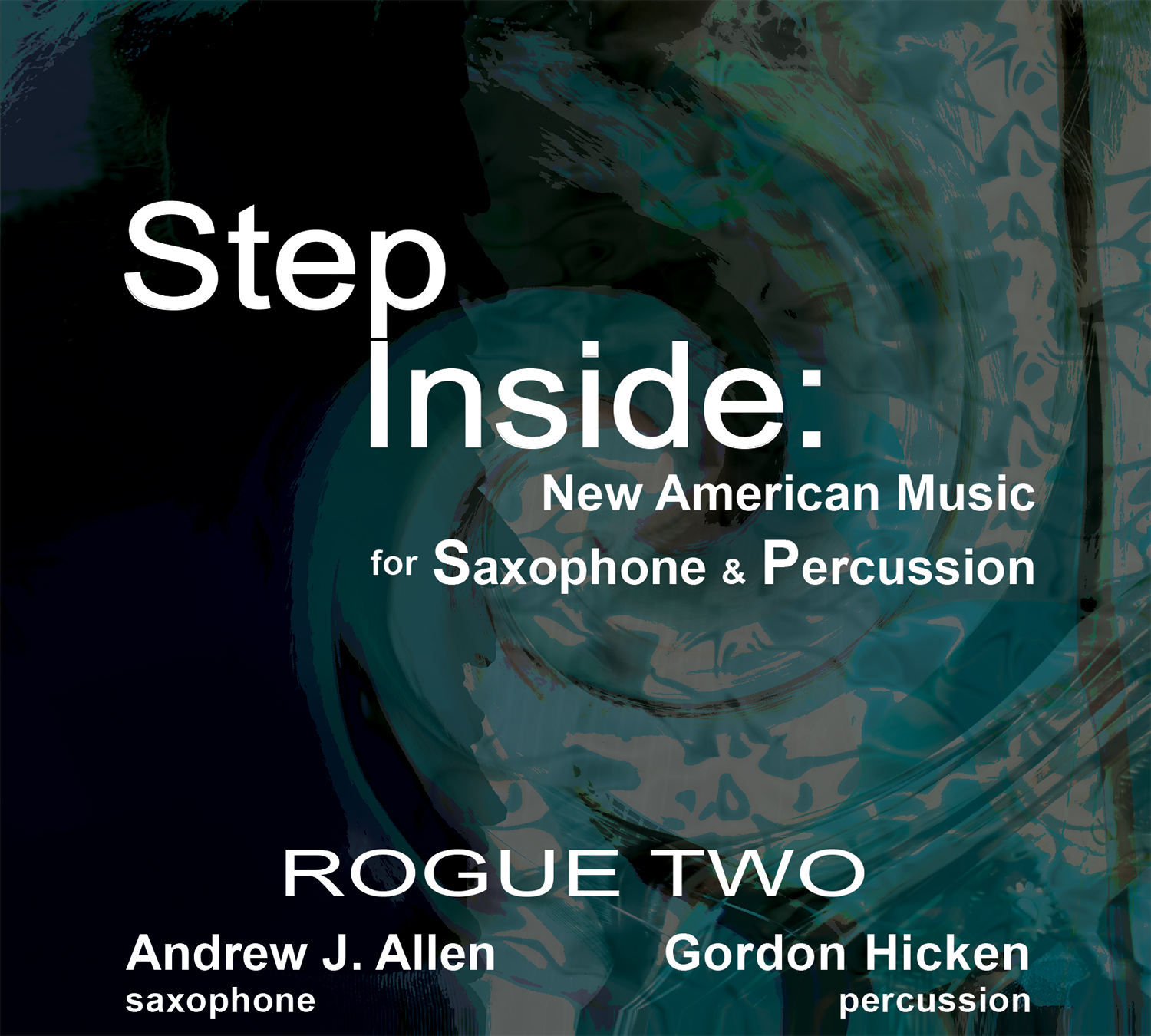
Fine Classical, Instrumental, and Specialty Recordings
Label: Equilibrium Item Number: EQ146 Format: CD Year Recorded: 2017 Step Inside: New American Music for Saxophone and Percussion Rogue Two
Rogue Two  Rogue Two is an ensemble dedicated to the commissioning and performance of new music for saxophone and percussion. Consisting of saxophonist Andrew J. Allen and percussionist Gordon Hicken, the group is especially interested in music that extends the timbral possibilities of this chamber combination. Dr. Gordon Hicken is the Assistant Professor of Percussion and Associate Director of Bands at Midwestern State University in Wichita Falls, TX. In addition to his duties at MSU, Dr. Hicken is a member of the percussion faculty at the Interlochen Summer Arts Camp in Interlochen, Michigan. Prior to his appointment at Midwestern State, Dr. Hicken served as the Interim Instructor of Percussion/Assistant Director of Bands at Angelo State University, the Drumline Director and Staff Percussion Arranger at the University of South Carolina, and an Adjunct Instructor of Percussion at Chipola College and Limestone College. As a performer, Dr. Hicken appeared as a soloist on the 2013 Percussive Arts Society International Convention’s “Celebration of Emerging Artists” showcase concert, and he was part of a Midwest tour and performance at PASIC 2011 as a member of the Florida State University Percussion Ensemble. Currently serving as the Principal Percussionist of the Wichita Falls Symphony Orchestra, he has also appeared with chamber ensembles and symphonies across the Southeastern United States and Texas, including the San Angelo Symphony Orchestra, Tallahassee Symphony Orchestra, Sinfonia Gulf Coast, Carolina Pops Orchestra, and Toccoa Symphony Orchestra. Dr. Hicken’s recent recording credits include performances on Adam Silverman: Percussion Music (2014, Calabaza Records) and The Florida State University Percussion Ensemble’s Volume 2: Not Far From Here (2012, Garnet House Records), as well as conducting on Scott Herring’s Carbon Paper and Nitrogen Ink: Works for Solo Marimba and Percussion Ensemble (2014, Resonator Records). Focused on improving the pedagogy of fundamental techniques for percussionists, Dr. Hicken presented sessions and clinics at the Florida Music Educators Association and South Carolina Music Educators Association Conventions, the College Band Directors National Association Athletic Band Symposium, and the South Carolina Day of Percussion. He is an active clinician in universities and secondary schools, where he regularly guest conducts percussion ensembles, adjudicates festivals, presents clinics and masterclasses, and teaches private lessons. Dr. Hicken arranges music for marching and concert percussion ensembles throughout the Southeastern United States, and his writing has been published in the Percussive Arts Society Educator’s Companion. Dr. Hicken holds a Doctor of Music Degree in Percussion Performance from The Florida State University, a Master of Music Degree in Percussion Performance from the University of South Carolina, and a Bachelor of Music Degree in Music Education from Furman University. His primary teachers include Dr. John W. Parks IV, Dr. Scott Herring, Dr. John Beckford, Prof. James Hall, and Mr. Ron Schwartz. Dr. Hicken is a member of the Percussive Arts Society, National Association for Music Education, College Band Directors National Association, Texas Music Educators Association, and Pi Kappa Lambda National Music Honor Society. He currently serves on the Percussive Arts Society University Pedagogy Committee, and he is a proud endorser of Pearl/Adams Musical Instruments, Zildjian Cymbals, Remo Drumheads, and Innovative Percussion Sticks and Mallets. In response to his recent New York solo debut, the Examiner opined that saxophonist Andrew J. Allen had “performed brilliantly,” and he has been praised by the Wichita Falls Times-Record News for his "savory warmth." In demand as a soloist and chamber musician, Allen has performed throughout the United States, Great Britain, and France. Nearly twenty works have been commissioned and premiered by him from such composers as Jesse Jones, Greg Simon, and Jay Batzner and current projects include new pieces from world-renowned composers Robert Lemay and Francois Rosse. Allen has received accolades as a quarter-finalist of both the Fischoff National Chamber Music Competition and the International Saxophone Symposium and Competition. As an ensemble musician, he has performed with the Lone Star Wind Orchestra, the Bryan Symphony Orchestra, the Midland Symphony Orchestra, Symphony Orchestra Augusta, and the South Carolina Philharmonic. He currently serves as principal saxophonist of the Wichita Falls Symphony Orchestra, and present chamber ensemble activities include Rogue Two, the flute and saxophone ensemble The Allen Duo, and SAGA Quartet. As a soloist, he has appeared with the Midwestern State University Wind Ensemble, the Midwestern State University Percussion Ensemble, and the Oklahoma State University Chamber Orchestra. Equally adept as a jazz saxophonist, Allen has served as a sideman with Gary Foster, Byron Stripling, Jeff Coffin, R&B luminaries The Temptations, and country music legend Ronnie Milsap. Allen is one of the most active researchers and public pedagogues of the saxophone today. His articles have appeared in The Instrumentalist, Teaching Music, The Saxophone Symposium, Saxophone Today, The NACWPI Journal, JazzEd, and School Band and Orchestra , among many other publications. Allen has lectured throughout the United States and abroad, and has presented clinics at music education conferences throughout the country, including the Texas Music Education Association Convention. He is editor of the NACWPI Journal and serves on the editorial board of The Saxophone Symposium. Andrew J. Allen is an assistant professor of music at Midwestern State University in Wichita Falls, Texas. He has previously served on the faculties of Claflin University and Valley City State University, and he holds degrees from Tennessee Technological University, Central Michigan University, and the University of South Carolina. His primary teachers include Phil Barham, John Nichol, and Clifford Leaman, and he has received additional instruction from Joseph Lulloff at the Brevard Music Center, and Claude Delangle, Vincent David, and Arno Bornkamp at the European University of Saxophone. Allen is an Artist-Clinician for Conn-Selmer, Inc. and performs exclusively on Selmer Paris saxophones. Not Available
Label: Equilibrium Item Number: EQ146 Format: CD Year Recorded: 2017 Rogue Two is an ensemble dedicated to the commissioning and performance of new music for saxophone and percussion. Consisting of saxophonist Andrew J. Allen and percussionist Gordon Hicken, the group is especially interested in music that extends the timbral possibilities of this chamber combination. Rogue Two’s debut album features world premieres of seven works commissioned by the ensemble. Particularly noteworthy is Jamie Wind Whitmarsh’s Buckle Up for alto saxophone and marimba, a soaring composition that evokes imagery of a joyful but mysterious dancer. Also enjoyable is Gene Koshinski’s Get It! for baritone saxophone and percussion, a funky mixed-meter romp. Hicken’s playing is flawless, and Allen is a master of all sizes of saxophone. This album is a great listen and will be especially inspiring for saxophonists interested in classical playing. - The Instrumentalist, April 2018 Rogue Two’s debut recording, Step Inside: New American Music for Saxophone and Percussion, Is a most welcome addition to the burgeoning saxophone chamber music scene. A true Duo, their music cannot be defined as strictly saxophone, or percussion literature. The compositions evenly display the highly developed skills and musicianship of both performers, while extending the timbral possibilities of this chamber combination. The first track, Step Inside, by Greg Simon introduces the ensemble with a unison, pointillistic melodic groove that gives way to a more contemplative dialog between soprano saxophone and marimba before developing a more complex melodic groove. This is thoughtful composition, full of beauty that satisfies audiences of all experience levels. Step Inside presented a dialogue between two musical voices. Jay C. Batzner’s Reflections On The Nature of Impermanence for tenor saxophone and snare drum shatters this dialogue. Brooding, ECM Records style tenor saxophone melodies existing for brief moments, interrupted by insistent snare drum solos. While Stephen Hicken’s Two Fragments for vibraphone and marimba is the first piece on this recording to abandon the duo format, it does provide a balance to the upcoming Leda Monologuefor solo alto saxophone by Jesse Jones. Both pieces work well as solo intermezzo pieces proceeding Jamie Whitmarsh’s Buckle Up for alto saxophone and marimba. My favorite piece on the CD, and perhaps the most mature composition, is Andy Francis’ Serenity for alto saxophone and percussion. This three movement work challenges the saxophonist with writing in the extreme range, while the percussionist utilizes various bowed percussion techniques and a large selection of instruments. The piece flows well with its difficult rhythms and long phrases. One can sense that the performers are dedicated to this piece and have prepared well for the performance. Get it! By Gene Koshinski is what everyone wants to hear, a very funky baritone saxophone and percussion that just makes you happy. The perfect encore to a recording that starts off with a good dialogue, turns introspective, becomes individualistic, reunites the duo and hits us with a tour de force saxophone and percussion piece. The pacing of the CD gives one the feeling of a thoughtfully programed recital. Worthy of any music library, Step Inside: New American Music for Saxophone and Percussionpresents a fresh approach to the saxophone and percussion duo. The literature presented is a departure from the complex intensities of composers such as Xenakis. Full of rhythmic counterpoint, ensemble interplay, sensitive percussive melodies, and virtuosic saxophone performance this recording belongs in your collection. -The Saxophonist, May/June 2018 | |||||||||||||||||||||||||||||||||||||||||||||||||||||||||||||||||||||||

 Amazon
Amazon Follow Us on Twitter
Follow Us on Twitter Follow Us on Instagram
Follow Us on Instagram Visit Our Partner Soundset Recordings
Visit Our Partner Soundset Recordings